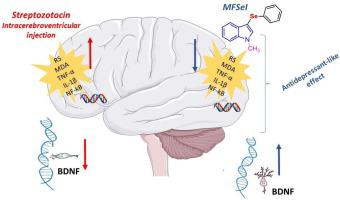Brain Research Bulletin ( IF 3.8 ) Pub Date : 2020-05-26 , DOI: 10.1016/j.brainresbull.2020.05.008 Suely Ribeiro Bampi 1 , Angela Maria Casaril 1 , Mariana G Fronza 1 , Micaela Domingues 1 , Beatriz Vieira 2 , Karine Rech Begnini 3 , Fabiana K Seixas 3 , Tiago Veiras Collares 3 , Eder João Lenardão 2 , Lucielli Savegnago 1

|
Major depressive disorder (MDD) is a chronic mental illness affecting a wide range of people worldwide. The pathophysiology of MDD is not completely elucidated, but it is believed that oxidative stress and neuroinflammation are involved. In light with this, the aim of the present study was to investigate whether a single administration of the antioxidant 1-methyl-3-(phenylselanyl)-1H-indole (MFSeI) was able to reverse the streptozotocin-induced depression-like behavior, oxidative stress, and neuroinflammation in mice. MFSeI (10 mg/kg) was administered intragastrically (i.g.) 24 h after the intracerebroventricular injection of STZ (0.2 mg/4 μL/per mouse). Thirty minutes after MFSeI administration, behavioral tests and neurochemical analyses were performed. Fluoxetine (10 mg/kg, i.g.) was used as a positive control. MFSeI and fluoxetine were able to reverse the STZ-induced depression-like behavior, as evidenced by decreased immobility time in the forced swimming test and increased grooming time in the splash test. Mechanistically, MFSeI reversed the increased levels of reactive species and lipid peroxidation in the prefrontal cortices and hippocampi of STZ-treated mice. Additionally, neuroinflammation (i.e. expression of NF-κB, IL-1β, and TNF-α) and the reduced mRNA levels of BDNF in the and hippocampi of depressed mice were reversed by treatment with MFSeI. Fluoxetine did not improve the STZ-induced alterations at the levels of reactive species, NF-κB and BDNF in the prefrontal cortices neither the levels of TNF-α in both brain regions. Together, these data suggest that the MFSeI may be a promising compound with antidepressant-like action, reducing oxidative stress and modulating inflammatory pathways in the brain of depressed mice.
中文翻译:

含硒化合物 1-methyl-3-(phenylselanyl)-1H-indole 可减轻链脲佐菌素治疗小鼠的抑郁样行为、氧化应激和神经炎症。
重度抑郁症 (MDD) 是一种慢性精神疾病,影响全球范围内的广泛人群。MDD的病理生理学尚未完全阐明,但认为与氧化应激和神经炎症有关。鉴于此,本研究的目的是调查抗氧化剂 1-methyl-3-(phenylselanyl)-1 H的单次给药是否-indole (MFSeI) 能够逆转链脲佐菌素诱导的小鼠抑郁样行为、氧化应激和神经炎症。在脑室内注射 STZ(0.2 mg/4 μL/每只小鼠)后 24 小时胃内(ig)给予 MFSeI(10 mg/kg)。MFSeI 给药后 30 分钟,进行了行为测试和神经化学分析。氟西汀 (10 mg/kg, ig) 用作阳性对照。MFSeI 和氟西汀能够逆转 STZ 诱导的抑郁样行为,这可以通过在强迫游泳测试中减少不动时间和在飞溅测试中增加梳理时间来证明。从机制上讲,MFSeI 逆转了 STZ 治疗小鼠的前额叶皮质和海马中活性物质和脂质过氧化水平的增加。此外,神经炎症(即,NF-κB、IL-1β和TNF-α的表达以及抑郁小鼠和海马中BDNF mRNA 水平的降低通过 MFSeI 处理逆转。氟西汀没有改善 STZ 诱导的前额叶皮质反应性物质、NF-κB和BDNF水平的改变,也没有改善两个大脑区域中TNF-α的水平。总之,这些数据表明 MFSeI 可能是一种有前途的化合物,具有抗抑郁样作用,可减少氧化应激并调节抑郁小鼠大脑中的炎症通路。


























 京公网安备 11010802027423号
京公网安备 11010802027423号